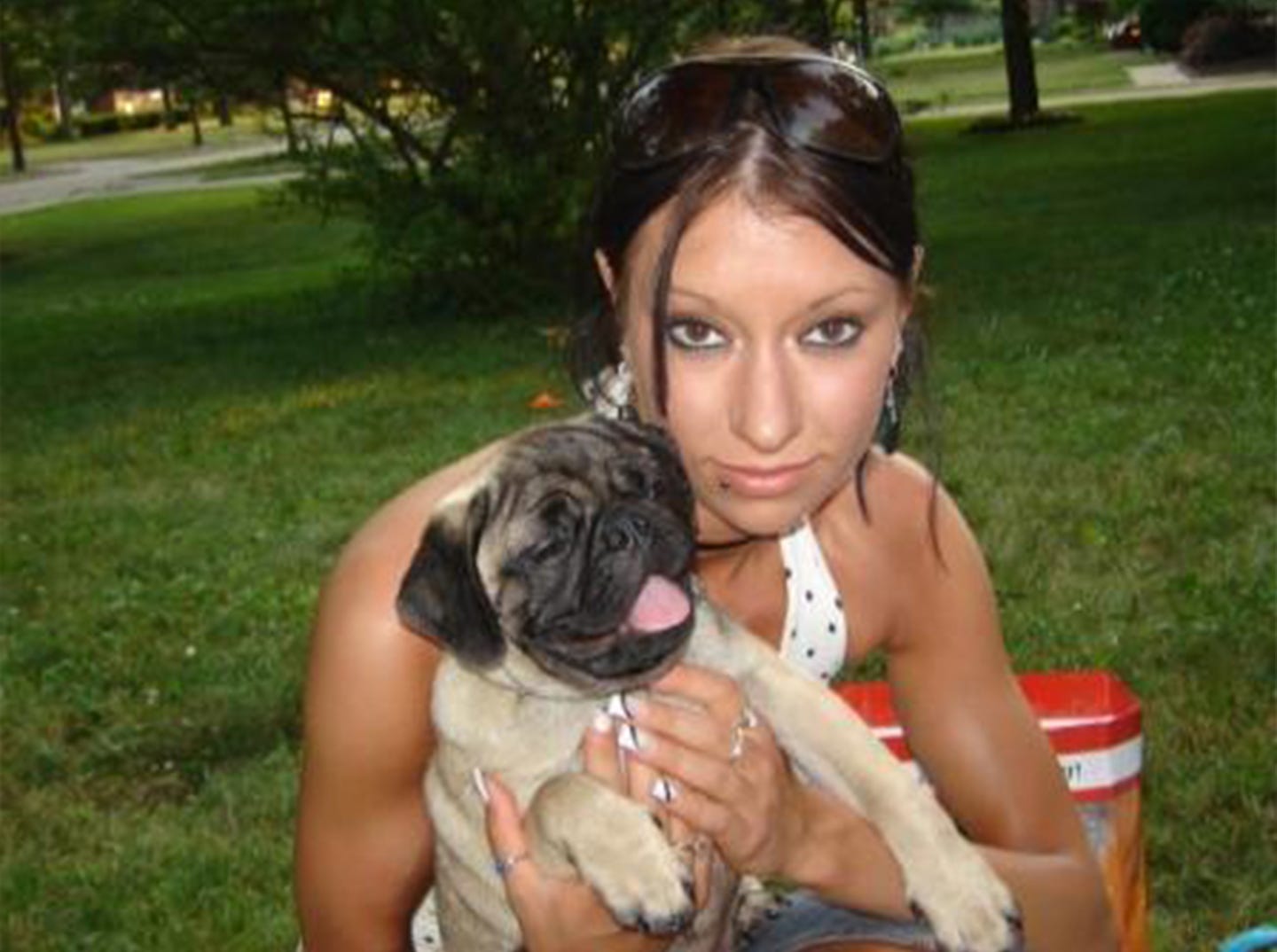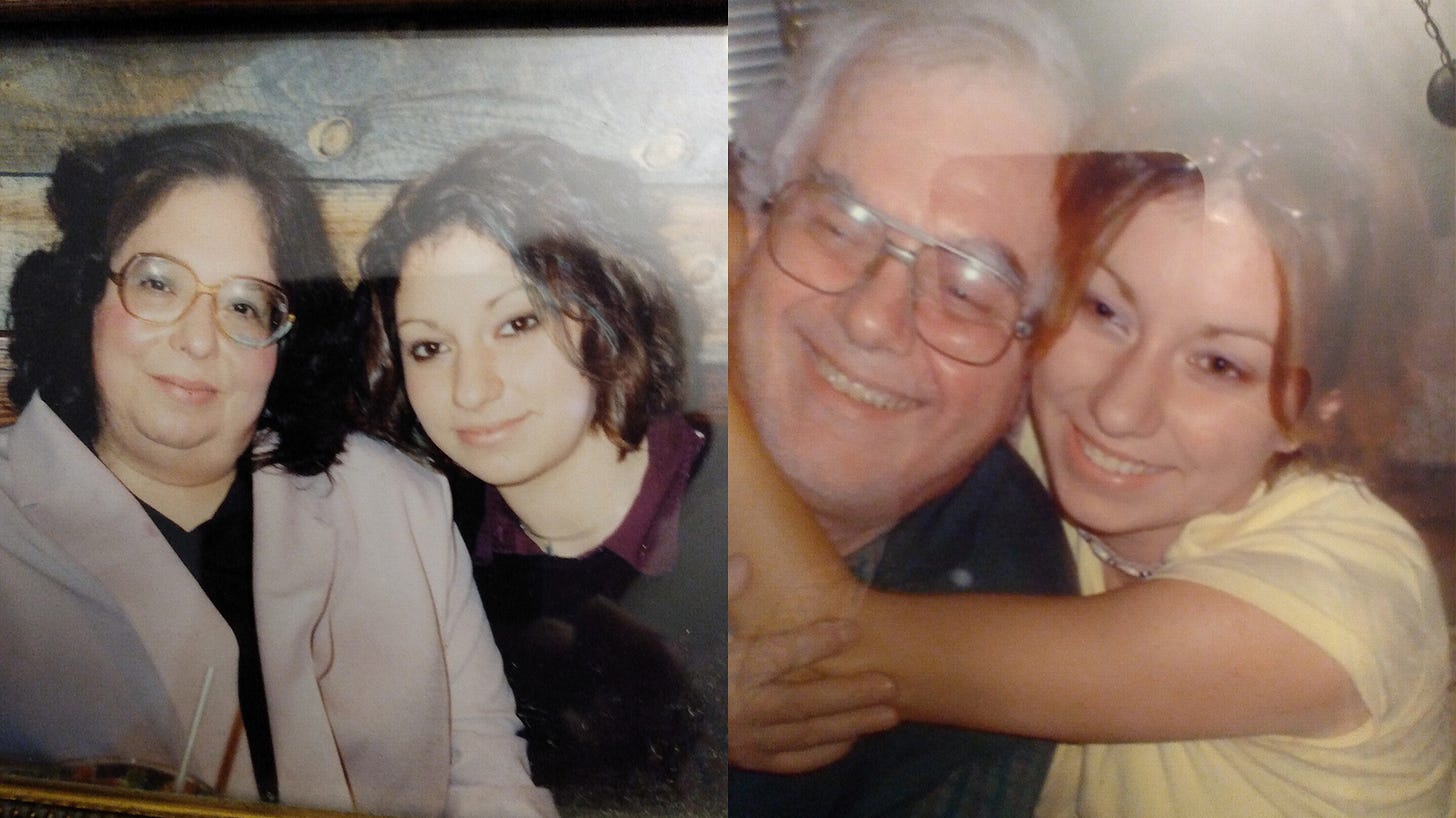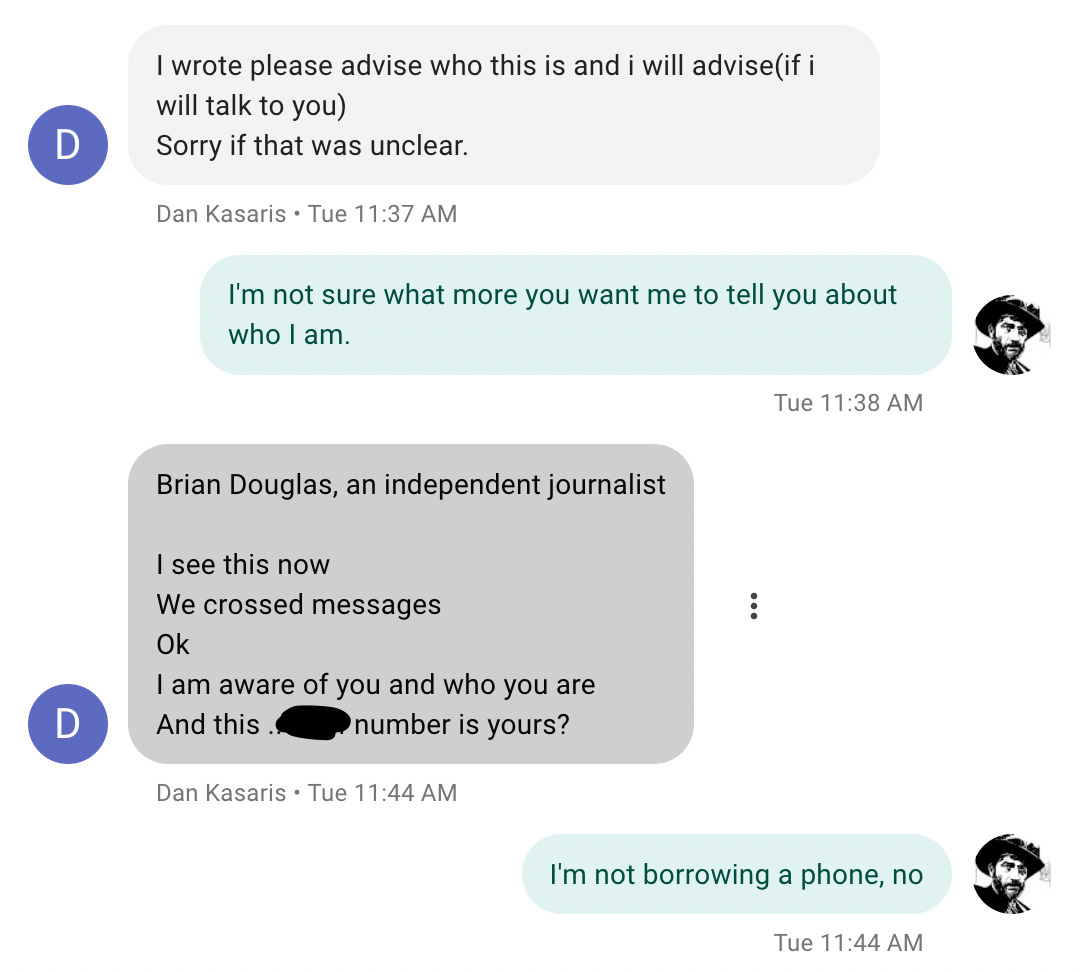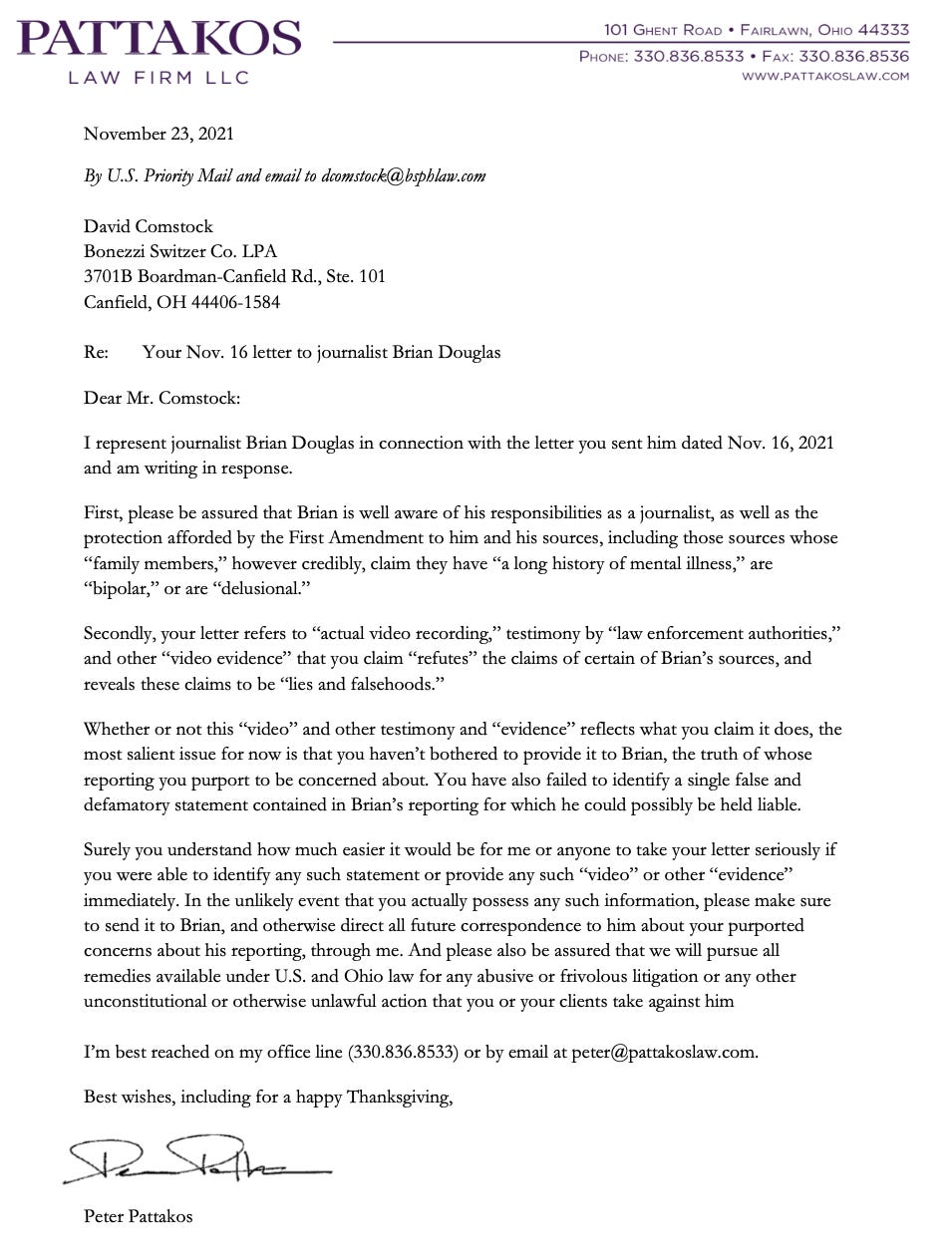Unreliable witnesses, suppressed evidence, and a dead whistleblower: The Prosecution of Tony Viola
Part 2 of an investigative series examining the prosecutorial misconduct of Dan Kasaris
The story of Tony Viola told in the press up until now leaves one with the impression of a devious criminal who was defrauding banks out of nearly fifty million dollars through a complicated mortgage fraud scheme with a cast of shady operators. If the news coverage was to be believed, the affable, honorable, and generous person Viola’s friends and family all knew was merely a facade hiding a duplicitous, unscrupulous, greedy monster.
Visitors of FreeTonyViola.com will find a much different story. It’s a scrappy but fairly polished little website managed by Viola himself, setup with the express purpose of providing journalists and lawmakers with evidence of Viola’s innocence by exposing what he and others familiar with the case believe to be flagrant prosecutorial misconduct.
Several local and national journalists have quietly taken an interest in his case, but have seemingly either been intimidated by the possibility of litigation, too busy to thoroughly vet Viola’s claims, or stymied by editors and publishers.
This is part two of an investigative series examining disturbing allegations of prosecutorial misconduct against Ohio Assistant State Attorney General Dan Kasaris. In part one, Kelly Patrick alleged that in 2009 Kasaris abused his position as Cuyahoga County prosecutor to prevent domestic violence and drug charges from being filed against her now ex-husband, John Patrick, who is also Kasaris’s brother.
Kelly Patrick remained silent about this story for over a decade, but was finally moved to come forward shortly after she discovered Viola’s website.
Early Life and Reputation
Tony Viola was born and raised in Cleveland, Ohio; went to college at Georgetown; and returned to be with his high school sweetheart, Katrina Rose. Rose was the one who first convinced Viola to go into the real estate business, and the two worked side by side fixing up and selling houses.
Viola’s ambitions were to build a life selling houses in his hometown alongside the woman he adored. Unfortunately this was not meant to be. Katrina Rose and her mother died in 1996 in the tragic TWA 800 disaster.
Viola picked up the pieces and continued to build a successful real estate business. Dave Muñoz, John Caputo, and Sarah Swarts, all long-time former employees or colleagues of Viola, were emphatic about his reputation as a decent man, with an abundance of character, who cared about his workers, customers, and community.
In the following interviews, each were asked about their experiences with Viola prior to being swept up by the mortgage fraud task force created in the wake of the 2008 financial collapse. They were asked about their understanding of the mortgage and real estate scandal, based on their diverse backgrounds in real estate, mortgage, and finance. None of them believed the media adequately delved into the details of the case against Viola.
The Federal Trial
In December 2008, Viola was shocked when his offices were dramatically raided and he was indicted and charged by a multi-jurisdictional mortgage fraud task force with wire fraud and conspiracy to commit wire fraud. Viola was one of nearly 1,000 defendants prosecuted by a task force assembled by then Ohio Attorney General Mike DeWine and led by then Cuyahoga County prosecutor Dan Kasaris and former Assistant U.S. Attorney Mark S. Bennett (now in private practice).
Throughout the federal trial, Viola and his friends maintained faith that he would be exonerated, assuming this was all some terrible misunderstanding or a mistake. It wasn’t until after he was convicted in the first trial that Viola discovered why he never had a chance.
The first unseen obstacle to Viola’s defense was his own attorney, Jay Milano. Witnesses like Muñoz, Caputo, and Swarts, who were willing and able to testify to his innocence were never called by Milano. The prosecution was also aware of these witnesses, but failed to produce defense witness statements before trial. Tony was convicted on all charges.
The Whistleblower
In 2008 Dawn Pasela obtained a position with the mortgage fraud task force as an office manager. During Viola’s federal trial in 2011, Pasela became increasingly troubled by the behavior of the prosecutorial team as she witnessed exculpatory evidence being destroyed, mishandled, and hidden from defense attorneys.
“An awful lot of liberties were taken. I’ve never seen anything like it”
-Bob Friedrick, Private Investigator & Retired FBI Agent
The unease she felt only worsened as the case progressed. Pasela, who was not a professional investigator, was instructed by the prosecution to wear a recording device, pretend to be a legal grad student interested in assisting Viola’s defense, and secretly record a series of post-indictment conversations with him in order to obtain confidential defense trial strategy information. Pasela also attended several legal defense fundraisers Viola’s supporters sponsored, and was instructed to donate funds toward Tony’s legal fees so Bennett and Kasaris could use her canceled checks to track legal and investigative expenses from the defense lawyer’s bank account.
After Viola was convicted on all charges in federal court, Pasela’s conscience began to compel her to do something to make things right. Her parents both agreed that what she had seen and been asked to do was wrong, but her mother was deeply concerned for Pasela’s safety if she decided to go up against her bosses. Pasela eventually decided to reach out to Viola as he awaited federal sentencing and his state trial, and confess to him all of the acts of prosecutorial misconduct that she witnessed and regretted participating in.
In addition to tampering, mishandling, and suppression of evidence, Pasela also told Viola about major problems with the prosecution’s witnesses. Witnesses like Scott “Steve” Newcombe, who was called in by the prosecutors but refused to go along with the narrative Kasaris and Bennett were locked into.
She also made Viola aware of the fact that Kasaris and Bennett had devised a strange process for interviewing witnesses. Subjects were essentially pre-screened by state detectives or officials in order to ensure that no favorable testimony to Viola would be logged, in accordance with proper procedure in federal court.
Most shocking of all was Pasela’s strong suspicion that Kasaris was carrying on a sexual relationship with Kathryn Clover, a defendant and key witness in multiple mortgage fraud cases Kasaris was prosecuting. That suspicion was later confirmed in emails between Clover and Kasaris that Viola obtained. Witnesses assisting in cases are typically called in as needed, but Clover was in the office constantly, given her own desk, sat in on meetings with other witnesses, and even had unsupervised access to evidence in a case where she was one of the defendants.
At one point during the federal trial, Bennett was informed that Clover committed perjury. Despite his legal obligation to do so, Bennett failed to withdraw Clover’s perjured testimony. In fact, Bennett and Kasaris continued to use Clover as a government witness in other cases and have faced no legal consequences for doing so.
“An awful lot of liberties were taken. I’ve never seen anything like it,” remarked Bob Friedrick, a retired FBI agent turned private investigator who has been working on Viola’s case for several years. “When I got involved, I just said, ‘This is just another guy who ended up in jail and says, ‘I didn’t do it,’ but the more you get into [Viola's case] you realize, he didn’t do it!”
State Trial
At Pasela’s urging, Viola represented himself in the state trial where he faced identical charges from the first trial. Pasela got to work assisting Viola in preparing exhibits, witness questions, and defense strategy. Viola recounted that Kasaris was continually caught off guard during the trial, wrongfully assuming he was not in possession of exculpatory evidence that Pasela had provided him.
Pasela kept her involvement with Viola a secret from the prosecution for as long as possible, but eventually agreed to have Viola subpoena her as a witness. Ironically, Kasaris would have been within his rights to prevent a member of his staff from testifying, had he and Bennett not compelled Pasela to spy on Viola for them.
Pasela instructed Viola to ask her very open-ended questions. This would allow her to fully testify on the record to all the unethical and illegal activities she witnessed while working for Kasaris and Bennett.
Once she was placed on the witness list, Pasela immediately started facing intense intimidation from the task force. Several FBI agents came to her home and issued a no-win ultimatum: Leave the state before the date of the subpoena, or face prosecution for violating a non-disclosure agreement (NDA). Pasela had never signed any NDA, and failure to appear for a subpoena would have resulted in fines and possibly a warrant being issued for her arrest.
In an email exchange with Viola, Kasaris reiterated his threat to prosecute Pasela and that he would use her personal struggles with drinking against her if she testified. Despite all of the threats and intimidation she faced, Pasela was committed to taking the stand and exposing Kasaris.
Pasela was scheduled to testify on April 24, 2012, but failed to appear in court that day. Her father, Edward, went to check on Dawn at her apartment, but couldn’t get her to answer the door. Edward called the local police at that point, and he was surprised to see that six officers answered the call instead of two (the norm for a wellness check). It took four police officers to keep Edward out of the apartment once he learned what had happened to his daughter. The night before, Dawn Pasela died of acute alcohol poisoning.
Autopsy photos show Pasela lying face down on top of her coat in the corner of her dining room. On the kitchen table was a bag containing two large bottles of cheap vodka; one was almost completely empty. The night before Dawn’s death, her mother Karen was at the apartment and recalled searching the place for any alcohol and pouring it down the drain, which may mean the vodka found at the scene had been purchased and consumed that day.
Pasela’s death was ruled an accidental overdose and has never been fully investigated for any evidence of foul play. Despite this tragic setback in Viola’s case, Pasela’s legal strategy ultimately led to Viola being acquitted on every count in his state trial. Viola and Pasela believed that the evidence that exonerated him was relevant to most of the other cases prosecuted by the task force, and wanted them all re-examined, particularly the cases where the conviction hinged on the testimony of Kathryn Clover.
In 2014, Viola reached out to Edward and Karen Pasela via a letter, expressing his gratitude for their daughter’s brave choice to help him overturn a wrongful conviction. Eventually, the Paselas agreed to provide Viola with affidavits attesting to all of the prosecutorial misconduct Dawn told them she witnessed and participated in, as well as the intimidation she faced in the weeks prior to her death.
“On her lunch break, she would buy two dozen roses, go to the mall and hand one to each person she saw that she thought needed lifting. That’s who Dawn was.”
- Karen Pasela, mother of Dawn
The Paselas granted an exclusive interview for this report, but requested that no audio or video be released due to privacy concerns. They also do not wish to be contacted by any more members of the press for comment on their daughter or Viola’s case.
“I wanted to follow through with Dawn’s wishes. It was wrong, what she told us about computers being missing and files taken out. There’s an injustice there,” Edward Pasela explained when asked why he and Karen decided to help Viola. “We don’t want her death to be in vain,” Karen added.
When asked to describe who Dawn was, outside of the role she played in Viola’s case, the Paselas painted the picture of a very kind soul who was loved and appreciated by all those who came to know her (one friend even flew in from California for Dawn's funeral). She founded the Criminal Justice Club at her local college and volunteered at nonprofits and animal shelters, demonstrating a passion for justice and an extraordinary capacity for selflessness.
With melancholy pride, Karen recalled her daughter’s generous spirit, “On her lunch break, she would buy two dozen roses, go to the mall and hand one to each person she saw that she thought needed lifting. That’s who Dawn was.”
The Struggle Continues
Despite Viola’s vindication in state court, Judge Donald Nugent refused to grant an evidentiary hearing so that Viola could appeal the federal charges based on the new evidence provided by Pasela at the state trial.
“There’s nobody in the federal government interested in his case, and that’s kind of sad. Well that’s more than sad, it’s scary.”
-Bob Friedrick
Viola spent nearly a decade in jail after proving his innocence at the state trial. Judge Daniel Gaul, who presided over that trial, expressed his dismay at Viola’s situation in a letter from 2017:
“Just thought I would write to express my feelings of regret on your continued incarceration. I had hoped that your exoneration in my courtroom would have assisted you in overturning your federal conviction.
In any case, I am writing to inform you that there is a newly elected Cuyahoga County Prosecutor. His name is Mike O'Malley. His office may be willing to take a fresh look at Daniel Kasaris' misconduct in your case. If Kasaris participated in your federal case, O'Malley's office may be able to intervene, or at least support a post-release remedy before Judge Nugent.”
Unable to vacate his sentence, Viola served over nine years of his twelve and a half year federal sentence at several prisons, including McKean, Lewisburg and Ashland Federal Correctional Institutions. Viola has been out on house arrest since May 2020. He currently resides in Cleveland Heights, and works at a local Goodwill.
Viola has filed complaints against Kasaris and asked for an investigation with the following agencies:
Ohio Attorney General Dave Yost
Ohio Ethics Commission
Cuyahoga County Inspector General
Ohio Supreme Court Office of Discipline Counsel
Cuyahoga County Wrongful Conviction Office
Ohio Public Defender
Viola also asked multiple federal agencies such as the FBI's "Inspection Division" and the Office of Professional Responsibility and the Department of Justice Inspector General to investigate this matter, also to no avail.
Viola insists that his struggle is less about clearing his name or earning his freedom, and more about honoring Pasela’s memory and spirit. Viola and Patrick have multiple active cases in several courts in Ohio and another in Pennsylvania. They are exhausting every legal avenue available to them to use the courts to hold Kasaris accountable for what he did to Viola, Pasela, and other defendants targeted by the task force.
In every court case since her death, Viola has pleaded with the courts to refer to the proper authorities the misconduct concerning Pasela, the affair between Kasaris, and Clover and the hiding of exculpatory evidence. None ever has.
When asked what he hopes will come of shining more light on Viola’s case, Bob Friedrick said:
I don’t think they ever came to the real truth of this case. I don’t think he got very good representation. It was a perfect storm that just destroyed Tony.
Now he’s living in a two-room apartment, and from there he’s doing his best to get himself exonerated and doing most of the work himself. There’s nobody in the federal government interested in his case, and that’s kind of sad.
Well that’s more than sad, it’s scary.
Viola has lost his freedom, his good name, the home he bought with the love of his life, and nearly all faith in the criminal justice system. Despite all of this, he remains optimistic, energized, and shows no sign of slowing down in his quest for justice for Dawn Pasela and anyone else who has crossed paths with a prosecutor like Dan Kasaris and Mark Bennet.
It is the hope of this reporter, Viola, Patrick, and all of their unshakable allies that this matter be fully investigated by state and federal officials, as well local, state, and national press.
Follow up and Kasaris Response
Viola and Patrick respond to criticisms to part 1 and answer some final questions as part 2 of this investigation reached its conclusion:
Kasaris’ Response
Dan Kasaris was contacted via text message on Tuesday, November 23rd. Here is the full exchange:
At 3:30pm, David C. Comstock, an attorney with Bonezzi Switzer Polito & Hupp, responded on behalf of Kasaris by phone.
He expressed an odd concern for this reporter and reminded him of where First Amendment protections are limited for journalists, and criticized the veracity of reporting that relied on the subjects interviewed, specifically the account of Kelly Patrick.
Comstock claimed that video evidence existed which contactradicts Patrick’s account of the domestic abuse incident, but at not time addressed her account of the drugs her husband was growing in the basement and the fact that he never faced charges.
Comstock claims to have sent a letter to this reporter by way of a form or email found on the website bzdug.com, which was never received. Comstock forwarded the letter shortly after the phone call concluded (pdf). The email it was addressed to was bzdouglas@bzdoug.com, an address that has never existed.
At the time of publishing, Comstock had not yet to provided the video evidence he claims undermines the reporting in part one of this series.
The phone call and letter were shared with Peter Pattakos, a local civil rights attorney, who is now representing this reporter in this matter. Pattakos did not hesitate in sending Comstock the following pointed reply (pdf):
Please subscribe to stay informed of future coverage of this and other stories of prosecutorial misconduct, police abuse, and political corruption in Ohio.
Brian “BZ” Douglas is an independent, reader-supported journalist, producer and researcher for State of Injustice, and host of the “BZ Listening” Podcast, covering movement politics and grassroots music.












